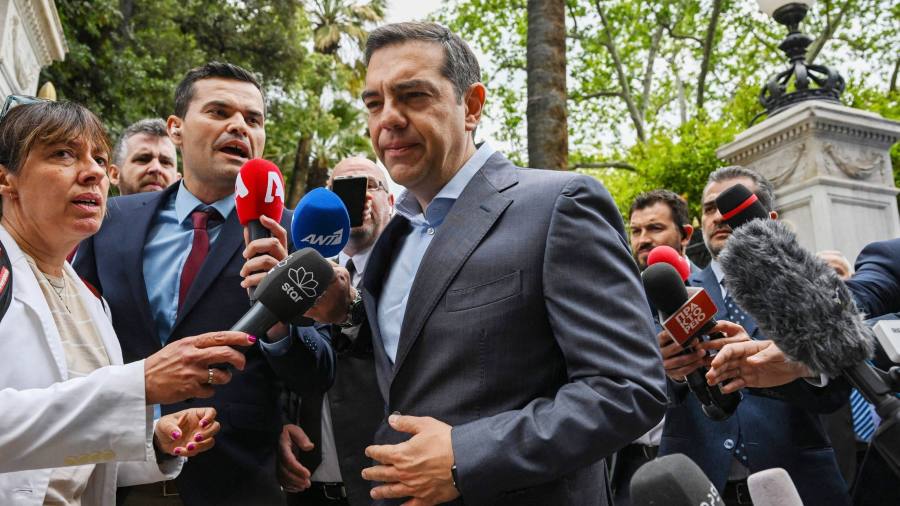Alexis Tsipras’s sudden rise to power as a radical leftwing firebrand was a searing moment for the whole EU, taking Greece to the brink of a euro exit.
Eight years on, the one-time political iconoclast is facing a more mundane challenge: rescuing his Syriza party from the ignominy of being replaced as Greece’s main opposition party.
Tsipras, who steadily moved towards the centre during his 2015-19 premiership, is now fighting to save his career after Syriza’s vote share crashed by more than 10 per cent in the May 21 election. He acknowledged that the result was “unexpected and painful”, especially for an opposition party during a cost of living squeeze.
With a further election due on June 25, Syriza’s arch-rival on the centre-left is now looking to press home its advantage. Pasok, an establishment party that dominated Greek politics before the financial crisis, will try to overtake Tsipras and restore its pre-eminent role in the Hellenic parliament, after it increased its vote share by three per cent in the recent elections.
Tsipras’s battle for relevance reflects broader shifts in Greek politics, as the financial bad-boy of Europe has repaired its economy to return to one of the fastest growth rates in the eurozone. Greek voters appear keen to move on — and to jettison the politician who once embodied the defiance of the bailout years.
To make matters worse for Tsipras, the ruling New Democracy party won more votes than four years ago, seemingly breaking the norm of Greek politics. The result reassured Prime Minister Kyriakos Mitsotakis that he would secure a majority government if he called fresh elections in a month.
Perhaps the only consolation: the party led by Tsipras’s estranged political partner Yanis Varoufakis, the former finance minister who took on Germany during the crisis, emerged with an even more dismal result from the election, failing to reach the 3 per cent threshold required to enter the Greek parliament. After his shortlived stint as minister, Varoufakis left Syriza and formed his own party, MeRA25, which most recently campaigned on introducing a digital system of payments named “Dimitra,” after the ancient Greek goddess of agriculture. Voters were not convinced.
Analysts put the blame for Syriza’s poor performance squarely in Tsipras’s court, citing his failure to adapt his rhetoric to Greece’s new reality.
Tsipras “did not offer a real policy proposal, failing to convince his own electorate”, said Stella Ladi, an associate professor at Queen Mary University of London.
By contrast, New Democracy’s message was positive, stressing that it would create stability and take the country forward, said Wolfango Piccoli, co-president of political risk at advisory company Teneo. Mitsotakis “sensed that the public wanted to bring an end to this toxic era of debt crisis politics”, he added.
“Syriza was a child of crisis and did not manage to outgrow it,” said Stathis Kalyvas, Gladstone professor of government at Oxford university.
During the campaign, Syriza invoked the polarised rhetoric of the decade-long economic meltdown, claiming that small and medium-sized companies were “drowning in debt” and that “young men and women see their dreams crushed” as hundreds of thousands of households faced repossession.
But the messaging rang hollow. “Greece had moved past that,” Kalyvas said.
By contrast, Mitsotakis’s government, which was embroiled in its own string of scandals, including over the wiretapping of Pasok leader Nikos Androulakis, managed to shake off the accusations and stay afloat. The new election will be under a different electoral law that will probably give the prime minister’s party a bonus of up to 50 parliamentary seats, enough to allow him to govern alone.
“People noticed that there was a sense of crisis management which was missing in the economic crisis years and voted for someone who promised more predictability in their lives,” said Kalyvas.
Tsipras has pledged to stay on for now, despite saying he took personal responsibility for the poor election result. “We are responsible for the citizens who did not vote for us,” he said in the first party meeting after the election.
But some say that keeping his position will be hard if Syriza’s share of the vote falls further.
“Syriza is very much associated with Tsipras”, said Kalyvas, because he was the one who led the party out of marginal obscurity and into power. “At the same time, he has been perceived as a political loser. For politics this is fatal.”
Read the full article here




